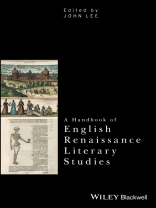Provides a detailed map of contemporary critical theory in Renaissance and Early Modern English literary studies beyond Shakespeare
A Handbook of English Renaissance Literary Studies is a groundbreaking guide to the contemporary engagement with critical theory within the larger disciplinary area of Renaissance and Early Modern studies. Comprising commissioned contributions from leading international scholars, it provides an overview of literary theory, beyond Shakespeare, focusing on most major figures, as well as some lesser-known writers of the period.
This book represents an important first step in bridging the divide between the abundance of titles which explore applications of theory in Shakespeare studies, and the relative lack of such texts concerning English Literary Renaissance studies as a whole, which includes major figures such as Marlowe, Jonson, Donne, and Milton. The tripartite structure offers a map of the critical landscape so that students can appreciate the breadth of the work being done, along with an exploration of the ways in which the treatments of or approaches to key issues have changed over time.
Handbook of English Renaissance Literary Studies is must-reading for undergraduate and postgraduate students of early modern and Renaissance English literature, as well as their instructors and advisors.
Divided into three main sections, ‘Conditions of Subjectivity, ‘ ‘Spaces, Places, and Forms, ‘ and ‘Practices and Theories, ‘ A Handbook of English Renaissance Literary Studies:
* Provides an overview of theoretical work and the theoretical-informed competencies which are central to the teaching of English Renaissance literary studies beyond Shakespeare
* Provides a map of the critical landscape of the field to provide students with an opportunity to appreciate the breadth of the work done
* Features newly-commissioned essays in representative subject areas to offer a clear picture of the contemporary theoretically-engaged work in the field
* Explores the ways in which the treatments of or approaches to key issues have changed over time
* Offers examples of the ways in which the practice of a theoretically-engaged criticism may enrich the personal and professional lives of critics, and the culture in which such critical practice takes place
Inhoudsopgave
Acknowledgments viii
Notes on Contributors ix
Introduction 1
John Lee
Part I Conditions of Subjectivity 13
1 Gender 15
Catherine Bates
2 Love and Friendship 29
James M. Bromley
3 Race and Colonization 43
Jean E. Feerick
4 Agency and Choice 56
John Lee
5 Religion and the Religious Turn 70
Julia Reinhard Lupton
6 Desire and Representation 86
Simon Ryle
7 Service 101
David Schalkwyk
8 The Body and Its Lives 115
William W.E. Slights
9 Objects and Things 130
Julian Yates
Part II Places, Spaces, and Forms 145
10 The Market 147
David J. Baker
11 Nature and the Non?]Human 159
Bruce Boehrer
12 Nation and Archipelago 173
Willy Maley
13 London 190
Ian Munro
14 The Church 206
Anne M. Myers
15 The Republic of Letters and the Commonwealth of Learning 220
Joanna Picciotto
16 Romance 235
Benedict S. Robinson
17 The Court 249
Lauren Shohet
18 The Household 265
Mary E. Trull
Part III Practices and Theories 279
19 Rhetorics of Similitude 281
Judith H. Anderson
20 Publication 295
Joshua Eckhardt
21 Authorship 310
Jane Griffiths
22 Reading 324
Mary Ann Lund
23 Science and Early Modern Literature 337
Howard Marchitello
24 Representation 353
Patricia Phillippy
25 Historiography 368
Nicholas Popper
26 Devotion 382
Timothy Rosendale
27 The Book 396
Helen Smith
28 Travel and Chorography 411
Angus Vine
Index 426
Over de auteur
John Lee is a Senior Lecturer at the University of Bristol, UK. His work on Renaissance English literature has included a selection of Spenser’s shorter poems and a monograph, Shakespeare and the Controversies of Self.












